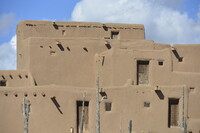Taos Pueblo
unknown (Native American)

Download1A3-NA-TP-A27_cp.jpg (310.5Kb)
Alternate file
Alternative Title
Pueblo de Taos
Date
1000-1450Description
Scuppers provide drainage from the flat roofs; the ends of the cedar logs (vigas) are visible near the roof lines; An ancient pueblo belonging to a Tiwa-speaking Native American tribe of Puebloan people. The pueblos are considered to be one of the oldest continuously inhabited communities in the United States. This has been designated a UNESCO World Heritage Site. Taos Pueblo's most prominent architectural feature is a multistoried residential complex (the largest Pueblo structure still existing) of reddish-brown adobe, built on either side of the Rio Pueblo. The North side of the Pueblo (Hlaauma) is divided by the Rio Pueblo (also called Red Willow Creek) from the South side (Hlaukkwima). The Pueblo's website states it was probably built between 1000 and 1450 CE. The original purpose was defense, with several foot thick adobe walls. As late as 1900, access to the rooms on lower floors was by ladders on the outside to the roof, and then down an inside ladder. In case of an attack, outside ladders could easily be pulled up. In the pueblo, electricity, running water, and indoor plumbing are prohibited. There are about 150 full time residents, and about 1900 Taos Indians living on Taos Pueblo lands. Source: Wikipedia; http://en.wikipedia.org/wiki/Main_Page (accessed 9/5/2015)
Type of Work
pueblos (housing complexes)Subject
architecture, Housing, Native North Americans, Pueblo (Native American style)
Rights
Rights Statement
Licensed for educational and research use by the MIT community only